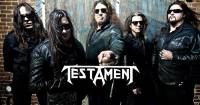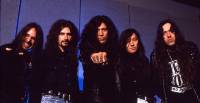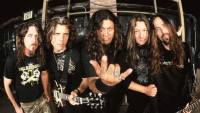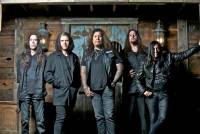Testament is an American thrash metal band from Berkeley, California. Formed in 1983 under the name Legacy, the band's current lineup comprises guitarists Eric Peterson and Alex Skolnick, lead vocalist Chuck Billy, drummer Gene Hoglan, and bassist Steve Di Giorgio. Since its inception, Testament has had numerous lineup changes, leaving Peterson as the only constant member. Billy replaced original singer Steve "Zetro" Souza (who left the band to join Exodus as the replacement of Paul Baloff) in 1986, prior to the recording of their first studio album, The Legacy, and has been a member of the band since. Peterson and Billy are the only members to appear on all of Testament's studio albums.
Testament is often credited as one of the most popular and influential bands of the thrash metal scene, as well as one of the leaders of the second wave of the genre in the late 1980s. The band has sold over 1.4 million albums in the United States since the beginning of the SoundScan era and over 14 million copies worldwide. To date, Testament has released eleven studio albums, four live albums, six compilation albums, twelve singles and three DVDs. After signing to Atlantic Records, and changing their name from Legacy to Testament in 1986, they released their debut album The Legacy in 1987, and broke into the U.S. mainstream with its follow-up album The New Order (1988). Their next four studio albums—Practice What You Preach (1989), Souls of Black (1990), The Ritual (1992) and Low (1994)—were also successful, with the former of the three entering the Top 100 on the Billboard 200 chart. Over the course of its career, Testament has experienced several resurgences of popularity (with their 2012 album Dark Roots of Earth and 2016 follow-up Brotherhood of the Snake entering the Top 20 on the Billboard 200) and has toured consistently. The band is currently working on their twelfth studio album, which is tentatively due for release in 2019.
Early career and The Legacy (1983–1987)
Testament was formed in the San Francisco Bay Area in 1983 by guitarist Eric Peterson and his cousin, vocalist Derrick Ramirez, also a guitarist, originally using the name Legacy. The band soon recruited bassist Greg Christian and drummer Mike Ronchette. Ramirez subsequently passed lead guitar duties to Alex Skolnick, who had studied under Bay Area guitarist Joe Satriani. Ramirez eventually departed and was replaced on lead vocals by Steve Souza before the band released one self-titled four-song demo in 1985. Ronchette left shortly after the recording and was replaced by Louie Clemente. Souza subsequently left the band to join Exodus, and suggested Chuck Billy to replace him on lead vocals. While recording their first album, the band was forced to change their name to Testament (which, according to Maria Ferrero in the May 2007 issue of Revolver, was suggested by Billy Milano of S.O.D.), because the "Legacy" name was already trademarked by a hotel R&B cover band.
Testament's first album, The Legacy, was released in April 1987 on Megaforce Records. Testament received instant fame within thrash circles and were often compared with fellow Bay Area thrash pioneers Metallica. The band quickly managed to increase their exposure by heading out on successful American and European tours with Anthrax, who were supporting their Among the Living album. On this tour, the Live at Eindhoven EP was recorded. Testament also opened for their labelmates Overkill, and Megadeth on their Peace Sells... but Who's Buying? tour.
Increasing popularity (1988–1992)
Testament's second album, The New Order, was released in May 1988, and found the band continuing in a similar vein. The album was a minor success, peaking at number 136 on the Billboard 200, but managed to sell over 250,000 copies. In support of The New Order, Testament opened for Megadeth on their So Far, So Good... So What! tour in Europe, and toured the United States with the likes of Overkill, Voivod, Death Angel, Vio-Lence, Nuclear Assault, Sanctuary, Raven, Forbidden and Heathen. They also made a number of festival appearances in the summer of 1988, such as Metalfest in Milwaukee, Aardschokdag in The Netherlands, and the European Monsters of Rock tour with Iron Maiden, Kiss, David Lee Roth, Great White and Anthrax.
After touring in support of The New Order, the band headed back into the studio to record their third studio album Practice What You Preach. Released in August 1989, the album minimized the occult and gothic themes found in the lyrical content of their first two albums, instead focusing on real-life issues such as politics and corruption. Practice What You Preach performed better on the charts than The New Order, reaching at number 77 on the Billboard200, and included the hit single, the title track, which saw extensive airplay on Headbangers Ball. Testament toured for almost a year behind Practice What You Preach with several bands, including Overkill, Annihilator, Wrathchild America, Mortal Sin, Xentrix, Nuclear Assault, Savatage, Flotsam and Jetsam, Mordred, Dark Angel and a then-relatively unknown Primus. Despite selling over 450,000 copies, the album has never been certified gold by the RIAA.
In October 1990, Testament released their fourth studio album Souls of Black. Although reviews were mixed, the album managed to sell respectably, in no doubt largely off the strength of the single title track, and saw the band perform on arena tours, including the European Clash of the Titans tour with Megadeth, Slayer and Suicidal Tendencies. Testament supported Souls of Black with two North American tours, opening for Judas Priest on their Painkillertour from October to December 1990, and Slayer on their Seasons in the Abyss tour from January to March 1991. They also toured Japan, and played shows with Anthrax and Sepultura. Shortly after completing the Souls of Black tour, the band released their first VHS documentary Seen Between the Lines, containing live clips recorded during the Souls of Black world tour, four promotional music videos and video interview segments.
Attempting to reconnect with an audience distracted by the growing grunge movement, Testament released The Ritual in 1992. It saw a stylistic move away from thrash to a slower, slightly more traditional heavy metal sound. The Ritual peaked at 55 on the Billboard Hot 100, the band's highest chart position at the time, and the power ballad "Return to Serenity" managed to receive radio airplay, peaking at number 22. Despite selling more than 485,000 copies in the United States, the album has never received gold certification. In support of The Ritual, Testament toured Europe and North America, headlining their own tours, as well as opening for Iron Maiden on their Fear of the Dark tour, and Black Sabbath on their Dehumanizer tour. However, the success of the album did not put an end to the tensions within the band.
Member changes; Low, Demonic and The Gathering (1992–2000)
The next decade was marked by a series of changes in the formation of the band, followed by a change of pace in its musical style. Lead guitarist Alex Skolnick left shortly after a concert on Halloween 1992, and three months later, drummer Louie Clemente left. Skolnick wanted to branch off to different styles of music such as jazz and he has stated that the band at that time did not know what they wanted to be, suffering from arguments on which direction the band should go is the main reason. Skolnick has also stated, that contrary to popular belief, it was not because he wanted more melody. As a result of this clash, Skolnick left soon after The Ritual's release. Skolnick would temporarily join Savatage, and later would become involved with an acoustic jazz band. Drummer Louie Clemente, in the meantime, moved toward a more stable career outside of music, selling modern art and furniture.
In 1993, Skolnick and Clemente were temporarily replaced by Forbidden members Glen Alvelais and Paul Bostaph, respectively. This lineup released the 1993 live EP, Return to Apocalyptic City. Soon after, Alvelais quit the band and Paul Bostaph departed to join Slayer. October 1994's Low featured John Tempesta on drums and death metal guitarist James Murphy, formerly of Death, Cancer, and Obituary. Low was a diverse album, featuring various influences such as death metal, groove metal, and as well as a ballad, "Trail of Tears". The band's remaining fans reacted favorably to Low although it did little to expand Testament's fanbase. Some fans, however, viewed Testament's move away from the mainstream as a liberation that allowed them to expand artistically, not being pressured by sales and success as they once were. Tempesta left after the recording of the album, being replaced by Jon Dette for the following tour. Jon Dette departed the band in 1995, during the 1994-1996 tour.
Dette's replacement was Chris Kontos, who had formerly been part of Machine Head. This lineup is featured on the Judas Priest cover Rapid Fire. After the 1996 club tour, Greg Christian, James Murphy, and Chris Kontos departed the band. During the time Kontos was in Testament he suggested the band drop the name altogether and call the band "Dog Faced Gods". This idea was turned down by Billy and Peterson who wanted to continue with the Testament name. The two later temporarily disbanded Testament.
The band's follow-up album, Demonic, released June 1997, took a new approach, and found Testament experimenting with death metal more. The album featured Eric Peterson on both lead and rhythm guitar (although Glen Alvelais made a guest appearance, and played on the subsequent tour), early member Derrick Ramirez on bass guitar, and former Dark Angel drummer Gene Hoglan. Hoglan left before the Demonic tour to join Strapping Young Lad, with Steve Jacobs doing the South American leg of the tour and Jon Dette returning later. Hoglan's loyalty to Strapping Young Lad and his desire to not remain a member of Testament actually came to realization during a published interview the band conducted with Metal Maniacs Magazine.
By 1998, Ramirez, Alvelais and Dette had departed and James Murphy had returned for the June 1999 release of The Gathering. The rhythm section onThe Gathering was highly respected, consisting of metal fretless bass pioneer Steve Di Giorgio (formerly of Death and Sadus) and original Slayer drummer Dave Lombardo. The sound of the album was largely a combination of death metal and thrash metal, with a minor black metal influence from Eric Peterson's side project, Dragonlord.
Read more on Wikipedia All Languages
Albums
The Legacy (1987)
The New Order (1988)
Practice What You Preach (1989)
Souls of Black (1990)
The Ritual (1992)
Low (1994)
Demonic (1997)
The Gathering (1999)
The Formation of Damnation (2008)
Dark Roots of Earth (2012)
Brotherhood of the Snake (2016)
Titans of Creation (2020)
Members
Eric Peterson – guitars, backing vocals (1983–present)
Chuck Billy – lead vocals (1986–present)
Alex Skolnick – guitars, backing vocals (1983–1992, 2005–present)
Gene Hoglan – drums (1996–1997, 2011–present)
Steve Di Giorgio – bass (1998–2005, 2014–present), backing vocals (2014–present)





